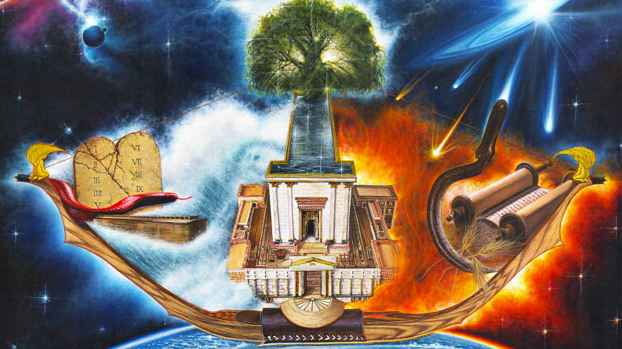
This incident is indicative of the kinds of struggles that young Modern Orthodox men and women are facing. Contrary to what the Orthodox Union would like to imagine, they do touch each other and they do want to talk about it. Or they don’t touch each other and want to talk about it. Some of them want to wear certain clothing, sleep with serious partners, hook up at bars. They also want to keep Shabbat, eat in only Kosher restaurants, and pray three times a day. They want community and continuity but they struggle against their hormones. Many choose to get married very young, while others keep their sexual exploits quiet and hidden. Some feel tremendous guilt and leave the system behind all together in order to avoid internal hypocrisy.
B’nei Yisrael, the Children, or Nation of Israel, is what Jews were called before they became “Jews.” Yisrael, or Israel, means to struggle with God, as Jacob was renamed after his fight with an angel. In all of Judaism, the struggle that comes with observance and understanding is just as important as the outcome. The good that Jewish law does, the value it provides is of paramount importance, and yet sometimes the system that we have constructed around it creates so many barriers against possible transgression that many are left out in the dark when other legal, intellectually and religiously honest solutions are possible.
A young woman of my acquaintance posed the problem it perfectly when she said to me, “all last year I said, ‘I don’t touch boys that I’m not dating,’ and then I hooked up with five that year. There is what we know and believe and then there is what we do. You have to explain that disconnect.” Striving for a world where the struggle to find what is “right for me” and “right for my community” is a powerful thing, but we should work toward a world in which the gap between what we believe and what we do is far narrower.
So how do we go about it? How do we find the balance between what is morally compelling and what is religiously proscribed? Rabbinic Judaism is rooted in the idea of covenant between God and man and between man and man. This covenant is specific to Jews and is articulated across generations through sacred texts that are the perpetual foundation of Judaism. The rituals and themes that make up cultural Judaism are rooted in rabbinic Judaism, and without the textual connection, the rituals and themes of culture cease to hold meaning as Judaism. For Judaism is an “interpretive community,” and this ongoing interpretation must grapple with the concerns that arise in every generation as history trudges on. (72) Judaism must use and wrestle with the specific texts in order to move forward as a community and constantly evaluate and incorporate assumptions and modernity into praxis.
A sexual ethic that is morally compelling is indeed a necessary thing, for how else are we to follow it if at our core we are left bereft? And yet, it is important to recognize that a requirement for something that is morally compelling can “devolve into soft relativism” and desires for that which is comfortable, titillating, or narcissistic. “For [a religious ethic] to be morally compelling [and sustainable], it probably [also] needs to be deeply embedded in tradition.” (73)
Jewish philosopher Moshe Sokol views personal autonomy as important, “but not necessary or sufficient in itself.” In his worldview, in which Torah law and its byproduct, rabbinic law, are inherently Divine, “a law is binding whether or not it its autonomously imposed.” (74)
Returning to Winkler’s idea that God and religion aren’t always in sync, there is space to speak of a soft autonomy where shifting societal values and evolved sexual ethics are part the theory of cumulative revelation. Ross explains that there are three assumptions that are essential to understanding cumulativism. The first is that revelation is a continuing process, “a dynamic unfolding of the original Torah transmitted at Sinai that reveals in time its ultimate significance.” (75) The second assumption is that this revelation is presented as a series of “hearings,” but not in the sense of God expressing Godself through actual vocal cords or through a non-anthropomorphic “created voice,” but through a rabbinic interpretation of the texts which can be “accompanied by an evolution in human understanding, and through the mouthpiece of history.” Hearing can be semi-prophetic inspiration, or it can be fine-tuning laws and understanding so that they are in line with the “constraints of the era and the ideas that they bring forth.” (76)
The final assumption is that even though new ideas that come out of these “hearings” may see to contradict older ideas, they never actually supplant them. Rather, the older ideas are the filter through which we understand and utilize the new revelations. This continued Divine presence, adding up of revelation incrementally through the prism of history, is how we have shaped halacha and tradition from Sinai until today (77), conceived of all that came before them. However, that is not to say that this cumulative view in any way excludes the notion of a Godly text; it simply allows for it to indeed be an “etz chaim,” a living Torah that breathes and moves, expands and contracts, and strives to pursue an evergreater standard of justice in line with the advancing principles of its time. Judaism can keep the rabbinic nature of its law and value system while finding morally compelling and textually honest ways to find value and contemporary wisdom in the shifts of time. Textual sources abound that hearken back to a multiplicity of ideas on sexual subjects, and so modern values of sexuality can be ground in the legal framework of the Sages of the Talmud. In this way, the pitfalls of the “thinness of self-authorship” (78) and how the rabbis of the Talmud may be avoided.
You may also like...
-

[button link="https://jewrotica.org/tag/pg/" color="#ff0066" size="3" style="1" dark="0" radius="auto" target="self"]PG[/button] [button link="https://jewrotica.org/tag/pg-13/" color="#ff0066" size="3" style="1" dark="0" radius="auto" target="self"]PG-13[/button] [button link="https://jewrotica.org/tag/rated-r/" color="#ff0066" size="3" style="1" dark="0" radius="auto" target="self"]R[/button] [button link="https://jewrotica.org/tag/xxx/" color="#ff0066" size="3" style="1" dark="0" radius="auto" target="self"]XXX[/button]




Like Us!
-
-
 jewrotica | February 18, 2023
jewrotica | February 18, 2023
Celebrating 10 Years & Marking the End of An Amazing Project
-
 jewrotica | November 23, 2016
jewrotica | November 23, 2016
-
 jewrotica | February 14, 2015
jewrotica | February 14, 2015
-
 sarah | February 28, 2013
sarah | February 28, 2013
-
 Karalyn | February 27, 2013
Karalyn | February 27, 2013
-
 Hugo Schwyzer | November 13, 2012
Hugo Schwyzer | November 13, 2012
-
 jewrotica | February 18, 2023
jewrotica | February 18, 2023
Celebrating 10 Years & Marking the End of An Amazing Project
-
 jewrotica | November 23, 2016
jewrotica | November 23, 2016
-
 jewrotica | February 14, 2015
jewrotica | February 14, 2015
-
 Arturo Desimone | May 2, 2019
Arturo Desimone | May 2, 2019
-
 Joseph Dunsay | May 1, 2019
Joseph Dunsay | May 1, 2019
-
Testimonials
You may not tell your mom that you’re going to a live Jewrotica reading (or whatever clever name you will dub these events) but you will tell your friends. However, both would be jealous if they find out that they missed it. I think it will only be a matter of time before Jewrotica helps us reclaim the term “Dirty Jew” the way rap music has done for “The ‘N’ Word.” I know I am now proud to be a Dirty Jew!
Ozzy Zion Nelson, Former Hillel JCSC Fellow and Quizmaster at Geeks Who DrinkI love the inclusiveness – there is something for everyone, in and out of the Jewish community.
Delma Catalina, Student Leader at Texas State UniversityBedside Reading with Jewrotica was funny, sexy, and hot all at once. The readings were honest about all kinds of sexuality, but the highlight of the evening was definitely the confessions, written by audience participants. Nobody knew who wrote them, and most were tell-alls that would make your bubbe blush. Unless your bubbe was very, very cool. Then maybe she’d make YOU blush!
Dan Young, Architect from Flagstaff AZ and Jewish Community Leader in Austin TXI’m so glad that Jewrotica is represented here at Jewlicious! It’s bringing voices that need to be heard in the Jewish discussion and Jewish climate environment.
Ramona Rubin, Grassroots Activist in Berkeley, CAThe people behind Jewrotica are quite quality! I have confidence that any project these folks take on will be equally quality.
Rabbi Drew Kaplan, Chaplain at Long Beach HillelsAt Jewrotica’s Evening of Bedside Readings, students declaimed monologues on sexual encounters that had a Jewish twist. At Columbia/Barnard Hillel, the speakers pushed their own boundaries by performing a range of explicit narratives that challenged how the audience thought of the relationship to Judaism and sex. During the speakers’ preparation, the arguments about which narratives would be appropriate forced students to take a stand and voice their opinion on their own beliefs about Judaism an… Read more
Engagement Coordinator at Columbia University / Barnard HillelJewrotica rocks. It’s funny, it’s informative, it’s sexy, it’s interesting. Check it out!
Sam C., Young Professional in the Valley, CAThe Jewrotica event “Evening of Jewrotica: Bedside Reading” was awesome. As Master of Confessions, I got to read the deepest, darkest secrets of people in the room out loud… It was scintillating, titillating, and – yes – even educational!
Sam S., Young Professional in the Austin AreaI had a great time deejaying at the Jewrotica event at Columbia University. The live readings were hilarious, informative, and in some cases, deeply moving. I know that I, along with many of my AEPi fraternity brothers, loved being able to connect our Judaism and our sexuality in a way that made all of us feel comfortable and welcome. I look forward to being a part of this again in the future!
Michael Richmond, Columbia University Class of ’13Jewrotica is something that the community has needed for a long time so that people can actually learn, express and share and have good relationships without having to stumble through life. Check out the site and learn something. Have fun!
Josh Kaplan, Jewish Community Organizer in Orange County, CADear Jewrotica
Confess
Copyright © 2014 Jewrotica.org. All Rights Reserved.
Built with Love and Mischief.
Designed by Ayo Oppenheimer and
David Abitbol





0 comments